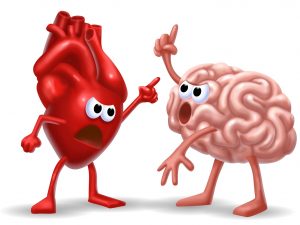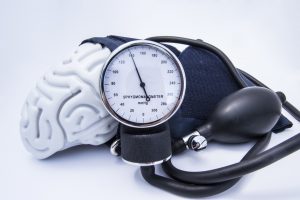
Stress of the mind can hurt your heart.
Your heart is racing. Your palms are sweaty. Sometimes you may feel dizzy, disoriented, or nauseous. These are all potential symptoms when you are faced with a stressful situation. However, one of the most dangerous symptoms of stress is constriction of blood vessels. A recent study has found that women may be more at risk for heart-related health problems in response to stress.
What is stress?
Stress is a normal reaction to the demands of life that can affect both the body and mind. A little bit can be healthy to remind you to be more alert or more motivated. However, too much can contribute to a variety of health conditions such as:
- ulcers
- digestive issues such as irritable bowel syndrome
- asthma
- headaches
- back pain
In addition to such conditions, stress can also increase blood pressure, which can in turn increase risk of heart disease. This is due to the body’s response to a perceived threat. The body goes into “fight-or-flight” mode in which the body constricts blood vessels to provide more blood flow to the major organs. Also, digestion slows to keep the body focused on providing blood to the brain and the heart. However, if anxiety or chronic exposure to the perceived threat(s) occurs, then this response can negatively impact health.
Women, Stress, and the Heart
A recent study in the journal Arteriosclerosis looked at 678 people with coronary artery disease, or plaques in the major arteries that affects blood flow. Each person was asked to engage in public speaking, a commonly known fear of many, to see if it triggered myocardial ischemia, or a reduction of blood flow in the heart.
About 15-percent of study subjects triggered myocardial ischemia. Men and women were affected by this condition at a similar rate, but the cause was different. In men, blood flow was mostly affected by high blood pressure and increased heart rate. On the other hand, in women it was caused by a constriction of blood vessels, also known as microvascular dysfunction. The difference between the two reactions is that in men, the perceived fear increased workload on the heart. However, in women, the dysfunction of vessels impaired blood flow. It is not known whether this increased incidence of myocardial ischemia can increase risk of heart disease, but such studies are being planned.
Healthy Ways to Deal With Stress
You can help decrease stress, and in turn, lower risk of heart disease in a variety of ways. The following list includes way you can lower stress on both your body and mind.
- Limit coffee and caffeine since such constrict blood vessels, thus impacting blood flow. Two to three cups a day is suggested for adequate health benefit.
- Quit or don’t smoke since smoking can also constrict blood vessels, and in turn blood flow, this increasing heart disease risk.
- Live a balanced life. It is important to make sure that as hard as you work in your job and in exercising, you should also rest your body just as readily. A good balance of rest and activity is around 30 minutes a day of moderate activity such as walking combined with about 7 hours of sleep each night. Being both active and resting well each night are important for the regulation of body fluids, blood pressure, and blood glucose levels in the body, among other things.
- Be mindful in everything you do. When you are more mindful and aware of the choices you make each day, it can eliminate a lot of stress on the body. The following are a list of small things you can do each day to be more mindful and in turn reduce stress on your body inside and out.
- Plan and prep meals and snacks ahead of time.
- Make healthy choices at meal and snack time such as less processed food and more fresh foods.
- Portion out food choices to prevent excess intake.
- Set a designated bedtime to help your body get more rest.
- Make a to-do list to keep track of your weekly tasks and delegate any tasks that you can to others.
- When you get stressed, give yourself a time-out with relaxation breathing to help you better face the situation at hand.
- Make time for yourself in your schedule by setting aside 15 minutes a day to meditate, read, or do something your enjoy to give your body and mind a break.
- Take supplements to help with sleep and managing stress. There are many herbal supplements on the market that claim to help with sleep and stress. However, it is important to do your research. Perhaps the supplement most well-known for its sleep-inducing properties is melatonin. It is actually a hormone produced by the brain’s pineal gland that affects the sleep/wake cycle and produces drowsiness. Those that may be deficient in this hormone may experience trouble sleeping or insomnia. However, it is important to remember that since it is a hormone, it may not be suitable for everyone, so be sure to check with your doctor first before starting a melatonin regimen.
Another supplement to try is Sereneo by Vita Sciences. Sereneo contains a combination of magnesium, chamomile, and valerian to help promote a feeling of calm by working to help reduce stress and anxiety. Valerian and chamomile have been found to be safe, natural herbal remedies to help induce sleep, while magnesium has been found to help promote reduced anxiety and irritability. Be sure to let your healthcare provider know before starting any new supplement regimen to be sure it does not interact with any of your currently prescribed medications.
-written by Staci Gulbin, MS, MEd, RD, LDN
Sources:
American Heart Association (June 2014) “Fight Stress with Healthy Habits”
American Heart Association (June 2014) “Stress and Heart Health”
Berkeley Wellness (October 1, 2013) “Can Supplements Help You Sleep?”
Centers for Disease Control (March 2, 2017) “How Much Sleep Do I Need?”
Mayo Clinic (March 31, 2017) “Stress Management”
Medline Plus (December 21, 2017) “Are Women’s Hearts More Vulnerable to Stress?”
Rodale Wellness (August 25, 2017) “4 Sleep Supplements That Actually Work”
 If you have ever tried to lose weight, then you probably have been told to track your calories. Most calorie trackers focus on keeping track of the calories you consume through food. On the other hand, fitness trackers or workout machines may track how many calories you burn during the day. However, is there more to the story of weight loss, or is calories in and calories out the only key to success? A recent report by health experts reveal that there may be more than simple math in the weight loss equation.
If you have ever tried to lose weight, then you probably have been told to track your calories. Most calorie trackers focus on keeping track of the calories you consume through food. On the other hand, fitness trackers or workout machines may track how many calories you burn during the day. However, is there more to the story of weight loss, or is calories in and calories out the only key to success? A recent report by health experts reveal that there may be more than simple math in the weight loss equation. you have high blood pressure, heart disease may be the health concern most on your mind. However, high blood pressure can be a risk factor for more than just heart conditions. A recent study has found that women in their 40’s with high blood pressure have an increased risk of dementia.
you have high blood pressure, heart disease may be the health concern most on your mind. However, high blood pressure can be a risk factor for more than just heart conditions. A recent study has found that women in their 40’s with high blood pressure have an increased risk of dementia. difficult. A recent study has found that low estrogen levels in some women may be linked to depression.
difficult. A recent study has found that low estrogen levels in some women may be linked to depression. with depression learn more about the condition. Also, this foundation helps support research efforts to find better treatments for those with depression.
with depression learn more about the condition. Also, this foundation helps support research efforts to find better treatments for those with depression.